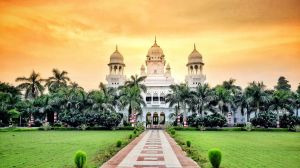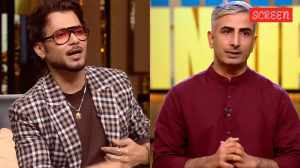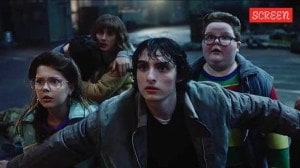Having an affair cost Australian ace Olympic presenters job
Sydney, August 17: Two star television presenters with the Australian network that will screen the Sydney Olympics have been sacked for ha...

Sydney, August 17: Two star television presenters with the Australian network that will screen the Sydney Olympics have been sacked for having an affair, it emerged on Thursday.
Grant, 36, has also been sacked as host of the network8217;s flagship current affairs programme Today Tonight,8217; reportedly because viewers were turned off by his philandering.
With the network fearing a backlash over Grant8217;s infidelity and Holmes8217; role in it, it opted to dump the pair rather than jeopardise its return on the 45 million it invested in securing the Games8217; broadcast rights.
Grant and Holmes have both previously attracted media attention for their high-profile relationships, in Grant8217;s case of the extramarital kind.
He revealed two weeks ago he had left his wife of 16 years and three children to move in with Holmes. It is the second such dalliance after an affair with a 22-year-old production assistant six years ago.
In a statement Seven said: 8220;The Seven Network and Tracey Holmes have announced on Thursday that they are reviewing her role with the network.8221;
Minutes later an identical statement arrived substituting Grant8217;s name for Holmes.
The couple have so far not commented.
The affair is believed to have started while they were on assignment in Greece covering the beginning of the Olympic.
UIPM hits back
MONACO: The International Modern Pentathlon Union UIPM said on Wednesday that it was shocked by criticism that it had failed to agree to doping controls for its Olympic athletes, claiming the attack was based on inaccurate information.8217;
The Federation, known by its French initials UIPM, was one of three singled out by the World Anti-Doping Agency earlier this week for failing to sign up for out-of-competition testing of competitors before Olympics.
WADA criticized the three holdouts8211; Modern Pentathlon, Gymnastics and Volleyball8211; for placing an unnecessary stigma of suspicion8217; on their competitors. UIPM said it was ready to sign and supported drug testing.
8220;UIPM maintains one of the most thorough and open anti-doping policies in the Olympic movement, and has done so for many years,8221; the body said in a statement.
Arts make early start
SYDNEY: The 2000 Olympics start on September 15 but cultural Olympians get a head start with the launch of a spectacular arts and entertainment programme on August 18.
Their six-week season is as international and star-studded as the two-week Olympics, a show to compare in scale and scope with the biggest Olympics in history.
The early start avoids the errors of the games in Atlanta four years ago when art competed too closely with athletics 8211; the show schedule of ten clashed with the Sports, with the result that musicians and dancers played to many empty seats.
When Sydney won the right to host the 2000 games, it was also given the responsibility of staging an Olympic cultural festival.
A cultural complement to the games is not an optional extra in the charter of the modern Olympics. The host city and country are required to present a comprehensive selection of National and international arts.
The Sydney Olympics arts festival offers symphony, opera, dance, jazz, cabaret, exhibitions, film, photography, World stars, premieres, specially commissioned works, unique loans of cultural and historic treasures and the best of Australian artistic achievements.
More than 4,000 artists will star in 53 major productions and 50 exhibitions across 45 venues. About one million spectators are expected, some paying 464 dollars for premium seats at gala concerts, many more seeing and hearing free events.
Apart from local orchestras, choirs, dancers, pop groups and painters, international stars will perform 8211; French prima ballerina Sylvie Guillem, Italy8217;s orchestra of La Scala and Tenor Andrea Bocelli and Pina Bausch8217;s dance company and cabaret singer Ute Lemper from Germany. Performers from the United States, Asia and Latin America are also booked.
Millie, Olly, Syd
SYDNEY: The Olympic medals have to be fought out, while the official mascots Millie, Olly and Syd can simply be picked up without effort by the visitors to the Sydney games.
Those who expected Kangaroos or Koalas will be disappointed as organisers chose for three other uniquely Australian animals: an Echidna Millie, a Kookaburra Olly and a Platypus Syd.
The foreign visitors will have a puzzled look when confronted with these animals and even Australians encounter only the Kookaburra on a regular basis.
Measuring between 42 and 46 centimetres and weighing in at over half a kilogramme, the Kookaburra is the largest member of the Kingfisher family and a familiar sight all over the country.
It moves with a family group and lives on a diet of small mammals, snakes, lizards and insects. The Kookaburra is also known as the laughing jackass8217; because of its loud, comical, human-like laugh.
In the Olympic sense Olly represents universal friendship.
The Echidna and Platypus are so strange that the early settlers had no idea what they were encountering.
The Platypus, after all, has the bill of a duck, the body of the otter, the tail of a beaver, large webbed fore feet and a double coat of fur.
Chances to see it in the wild are practically zero as it lives in tunnels in the sides of river banks and hunts in the water for its diet of crustaceans, molluscs, frogs, worms and insect larvae.
Millie is named for the new millennium and stands for Sydney8217;s optimism and hope going into it, Syd the platypus reflects Australia8217;s energy and vigour.
- 01
- 02
- 03
- 04
- 05































